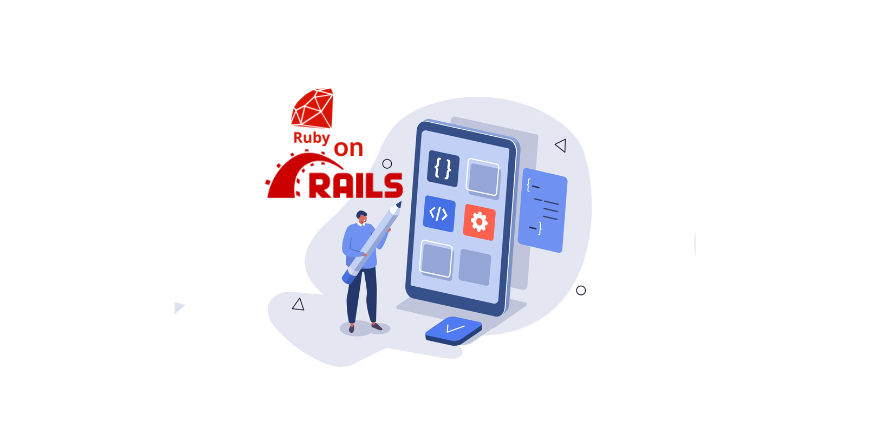Is Ruby on Rails mobile app development feasible?
Whoever conquers the mobile market, conquerors the entire tech industry.
In fact, the apps on mobile operating systems are the very examples of how the mobile market hyped with over 140 billion app downloads in 2016 to 218 billion app downloads in 2020.
This number is insane and it’s still skyrocketing.
Microsoft lost the war of smartphones just because its platform didn’t support huge numbers of apps that android and iOS covered.
To put it simply, mobile apps decide the fate of the mobile market.
And as a company, if you want to gain market share and strategically attain goals, you should build mobile apps that deliver outstanding performance, and unique user experience.
In our opinion, the answer to the feasibility question is yes, Ruby on Rails can produce quality mobile apps with its rich feature set and gem support.
But what makes Ruby on Rails mobile app development so appealing? And what benefits does it have?
We have put our thoughts to answer these questions. This article will give you in-depth info on Ruby on Rails mobile app development, its benefits, why it’s an ideal companion for the backend, and how you can convert Ruby on Rails web apps into mobile apps.
The Purpose of Ruby on Rails
Since its first release, Ruby on Rails has been the finest framework for building web applications.
Also, the framework was the one that made Ruby popular for web development in the first place, giving the Ruby community the exposure they needed.
Over the years, its latest release brought some exciting features like Gems, metaprogramming, Rails migration, and Active controllers which made developers adore it for developing sophisticated websites.
And soon it became the only framework that can compete against JavaScript and Node JS web development.
But the reality is it’s good for both web and mobile app development. It offers plenty of features and functionalities required for developing performative mobile apps for both iOS and Android.
Read our article on the Best Ruby Frameworks for web development in 2023.
Why is Ruby On Rails Mobile App Development Unheard?
It’s natural to wonder why mobile projects deny Ruby on Rails as an alternative. A possible explanation could be that everyone always thought of Ruby on Rails as a web technology because that’s what it was popular for.
And this popularity resulted in the potential for mobile app development being overlooked by many mobile development companies.
This means many are still unaware of Ruby on Rails mobile development and its benefits just because of its success in the web development domain, which is why it’s considered mostly for websites.
But the truth is, Ruby on Rails can bring the same benefits of web apps to mobile apps with its effective backend implementations.
Check out our video on – Is Ruby on Rails the New Popular Programming Language?
The Alternatives of Ruby on Rails Mobile App Development
When you favor Ruby on Rails for mobile apps, you get two alternatives. And you might have to choose between the two.
- Build a web app that functions similarly to a mobile app.
- Develop a native Ruby on Rails mobile app.
Both are the best options, but they require different resources and serve different projects so it’s important that you discuss your project goals and constraints and pick the ideal alternative of Ruby on Rails for mobile apps.
Apart from this, you should also consider the target audience, and understand their needs to have a clear idea of choosing the exact alternative.
In case you need assistance, Optymize can help you in picking the right alternative with expert Ruby on Rails developers who understand its key concepts from its very core. Because the Ruby on Rails web app framework is of no good if it’s not paired with expert developers.
Find out How To Hire Ruby on Rails Developers At a Reasonable Price
The Criteria For Mobile App Backend Development
Before you move to the backend of mobile app development you have to assess the capability of the framework for backend implementations. And it can be determined using a few factors of the app like users’ data, how it will display the data based on user’s behavior, how it will authenticate a user and provide authorization, how it can configure functionalities etc.
These are advanced features that a mobile app should have. Additionally, it would need a back-end API to access the back-end data for the mobile app.
So before we assess the capabilities of Ruby on Rails for back-end mobile development, let’s understand what back-end development is.
The Purpose of Backend
The backend manages and controls the application’s data flow and user behavior and other varied integrations including the following purposes.
- > Data synchronization on different platforms
- > Data storage capability
- > Notifications and alerts
- > Support for HTTP methods
Backend Architecture of Mobile App Development
The back-end architecture contains an application server, a web server, and a database. If the architecture requires scaling, then it might need a load balancer and other service integrations like push notifications, email notifications, and queuing assistance.
The features and functionality you want to integrate into the app solely depend upon what the app is supposed to do.
The Backend technologies for Mobile App Development
The backend technologies in your mobile apps are used for flawless communication between your web server, app, and database.
There are multiple programming languages built for server-side development, such as PHP, Ruby, Java, Python, and .NET. Along with this you also require tools like MySQL, SQL server, and Oracle to find, save, and modify data and share it to the front end part where users can interact.
- > Server-side programming languages: Python, Ruby, .Net, Java, PHP C++, Golang
- > Application Servers: GlassFish, Apache, Nginx, IIS, J2EE,
- > Database Servers: MySQL, MongoDB, Oracle, SQL Server, Redis, SQLite, PostgreSQL
Related Post: Ruby on Rails vs Laravel: Which Framework is Better for Web Development
Why Choose Ruby on Rails for Mobile Backend?
Ruby on Rails was designed to facilitate rapid development, whether it’s for web or mobile app development it stands out as a unique option. For instance, it follows some of its core principles like DRY, convention over configuration, keeping it as simple as possible, and CRUD (create, read, update, delete).
These principles focus on reducing developers’ hassles while developing backend systems. For example, its DRY principle helps in only creating fresh codebases and re-using others as per the requirement of the project.
The convention over configuration principle is among the best which lets developers spend more time on writing fresh codes while bearing minimal configuration hassles like API integrations and implementation of security protocols.
Using Ruby on Rails, it is easy to change the existing codes or add new features on top. Even after you deploy your app, you can alter the data model rapidly. The solidity and predictability of this framework make it the best option for the backend of Ruby on Rails mobile app development.
Also one of its interpreters, RubyMotion, has the capability of developing cross-platform apps using Ruby on Rails for iOS and Android platforms.
Moreover, it comes with its own set of Ruby Gems which extends projects or Rails backend for iOS apps and android apps. Also, it natively supports the built-in feature of Cocoapods.
With such use cases for the backend Ruby on Rails, mobile app development becomes ideal.
The Benefits of Ruby on Rails Mobile App Development
Similar to web development you get the major benefits of using Ruby on Rails for mobile apps.
Cost and Time Efficiency
Ruby and Ruby on Rails are open-source, and anyone can use them without paying any subscription cost. Moreover, you can access free plugins, gems, and other code libraries that are made available by the Ruby community for any type of development needs.
Additionally, the features of Ruby on Rails accelerate app development rapidly so you can develop applications ahead of project deadlines.
Code Less
Ruby on Rails comes with pre-built code libraries which allow you to code less and implement functionalities rapidly.
Moreover, it follows its very principles of convention over configuration, don’t repeat yourself and others that help developers to code only when needed and avoid the hassles of tedious configurations.
Scalability
You don’t have to worry if the number of users on your Ruby on Rails app increases as it can be easily scaled. This means it can handle incoming traffic with greater efficiency while giving the utmost performance.
Community
A huge community is always a great help for developers especially if they are new to the technology. The Ruby on Rails community offers plenty of resources where you can learn about problems and get the easiest solution within a short period.
Moreover, you can access free Ruby gems, and code libraries from the Ruby community for rapid mobile development practices.
How Can You Convert Ruby On Rails Web Apps To Mobile Apps
RoR is based on MVC architecture, which means one can render and call frontend APIs whenever required to integrate with the rails backend for mobile application development.
Here is how you can convert your current Rails application into a mobile app with the help of APIs.
- > Create the directory
- > Create required resources
- > Generate the Controllers
- > Run Rails migrations
- > Set up required associations
- > Populate required seeds
- > Write necessary routes
- > Create routes as per your project
- > Run the seeds
- > CORS- cross-origin resource sharing
Related Post: How to Fine-Tune your Rails application with Rails Service Objects
Popular Ruby on Rails Mobile Applications
Though everyone only knows Ruby on Rails for web application development, some companies have already built Ruby on Rails mobile apps. And some of the popular apps are
- > GitHub
- > Airbnb
- > Basecamp
- > Fiverr
- > Dribble
Conclusion
Although Ruby on Rails excels at web application development, it also excels at developing mobile applications.
The good thing here is that, if you have previous experience in developing Ruby-based solutions, you can easily move to Ruby on Rails mobile app development as it follows similar principles.
It provides features that ease mobile app development without compromising its performance.
Furthermore, using Ruby on Rails alongside the Rhodes framework, Sencha Touch, and JavaScript libraries, developers can deliver powerful, scalable, and performant Rails mobile applications.
But like we said earlier, a framework like Ruby on Rails is of no use if it’s not paired with developers who have expertise in Ruby on Rails, from the basic language fundamentals to its core principles like APIs, databases, security protocols, and business logic implementation.
Optymize is a global player when it comes to providing companies with elite Ruby on Rails developers. We help you scale your team within 48 hours of the call with talented developers who are rigorously vetted by our intelligent talent cloud.







